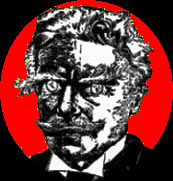 |
the AMBROSE BIERCE site |
 |
the AMBROSE BIERCE site |
|
by Ambrose Bierce 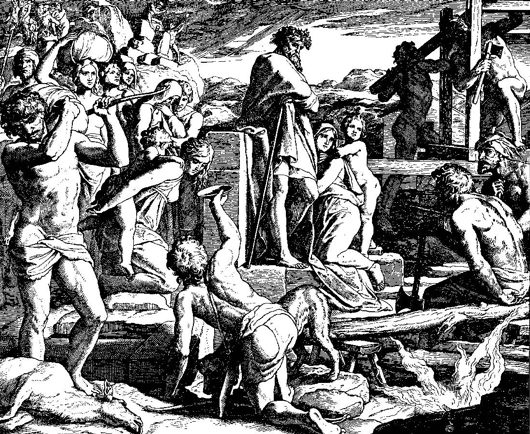 Book of Genesis (Bierce pictured far left, top) ALLAH. The Mohammedan Supreme Being, as distinguished from the Christian, Jewish, and so forth. APOSTATE. A leech who, having penetrated the shell of a turtle only to find that the creature has long been dead, deems it expedient to form a new attachment to a fresh turtle. ARAB. A scourge created in order that the wicked may torture us by mispronouncing his tribal designation. For our sins they call it Ay-rab. ASTROLOGY. The science of making the dupe see stars. 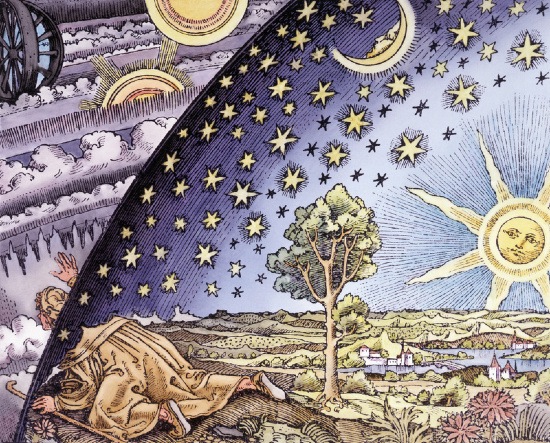 pre-science astrology (and still taken seriously) BAAL. An old deity formerly much worshiped under various names. BAPTISM. A sacred rite of such efficacy that he who finds himself in heaven without having undergone it will be unhappy forever. It is performed with water in two ways--by immersion, or plunging, and by aspersion, or sprinkling. BATH.A kind of mystic ceremony substituted for religious worshop, with what spiritual efficacy has not been determined. BUDDHISM. A preposterous form of religious error perversely preferred by about three-fourths of the human race. CANONIZE. To make a saint out of a dead sinner. CENOBITE. A man who piously shuts himself up to meditate upon the sin of wickedness; and to keep it fresh in his mind joins a brotherhood of awful examples. CHRISTEN. To ceremoniously afflict a helpless child with a name. CHRISTIAN. One who believes the New Testament is a divinely inspired book admirably suited to the spiritual needs of his neighbor. 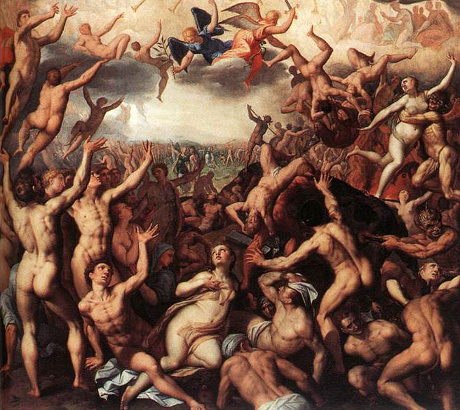 naked non-Christians experience the wrath of the Lord CHRISTMAS. A day set apart and consecrated to gluttony, drunkenness, maudlin sentiment, gift-taking, public dullness and domestic behavior. CHURCH. A place where the parson worships God and women worship the parson. CLERGYMAN. A man who undertakes the management of our spiritual affairs as a method of bettering his temporal ones. CONFESSION. A place where the priest sits to forgive the big sins for the pleasure of hearing about the little ones. CONGREGATION. The subjects of an experiment in hypnotism. CONJUGAL. Relating to a popular kind of penal servitude -- the yoking together of two fools by a parson. CONVENT. A place of retirement for women who wish for leisure to meditate upon the vice of idleness. CROSS. An ancient religious symbol erroneously supposed to owe its significance to the most solemn event in the history of Christianity, but really antedating it by thousands of years. By many it has been believed to be identical with the crux ansata of the ancient phallic worship, but it has been traced even beyond all that we know of that, to the rites of primitive people. 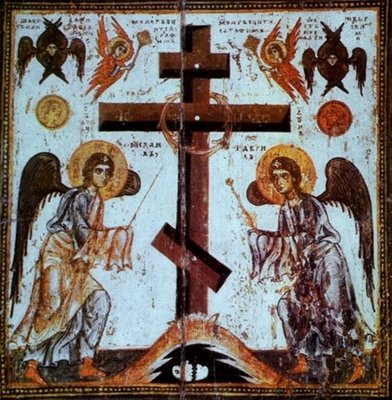 two angels across from one another DECALOGUE. A series of commandments, ten in number -- just enough to permit an intelligent selection for observance, but not enough to embarrass the choice. DEIST. One who believes in God, but reserves the right to worship the Devil. DELUGE. A notable first experiment in baptism which washed away the sins (and sinners) of the world. DEMON. A man whose cruelties are related in the newspapers. See "Fiend in Human Shape." DEVIL. The author of all our woes and proprietor of all the good things of this world. 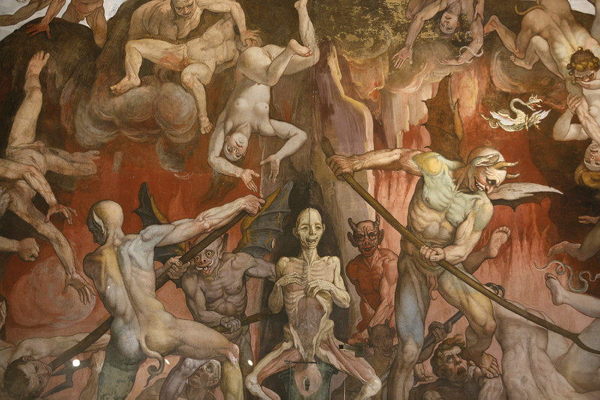 demons and devils partying DEVOTION. A mild type of mental aberration variously produced; in love, by a surplus of blood; in religion, by chronic dyspepsia. DIVINATION. The art of nosing out the occult. Divination is of as many kinds as there are fruit-bearing varieties of the flowering dunce and the early fool. ELYSIUM. The Heaven of the ancients. Nothing could be more ludicrous than this crude conception: instead of golden clouds, harps, crowns and a great white throne, there were fields, groves, streams, flowers and temples. In the ancient Elysium we have a signal example of the inferiority of pagan imagination to Christian knowledge. EVANGELIST. A bearer of good tidings, particularly (in a religious sense) such as assure us of our own salvation and the damnation of our neighbors. EPITAPH. An inscription on a tomb, showing that virtures acquired by death have a retroactive effect. EXCOMMUNICATION. FAITH. Belief without evidence in what is told by one who speaks without knowledge, of things without parallel.This "excommunication" is a word 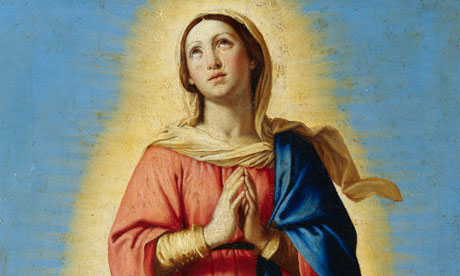 faith FOLD. In ecclesiastical affairs, the fold means the church. FREETHINKER. A miscreant who wickedly refuses to look out of a priest's eyes, and persists into looking into them with too searching a gaze. Freethinkers were formerly:By plain analogy we're told
GENESIS. The first of the five sacred books written by Moses. The evidence of that great man's authorship of this book and the four others is of the most convincing character: he never disavowed them. GENUFLECTION. Leg-service. The act of bending the knee to Him who made it that the posture is unnatural and fatiguing. HEATHEN. A benighted creature who has the folly to worship something he can see or feel. 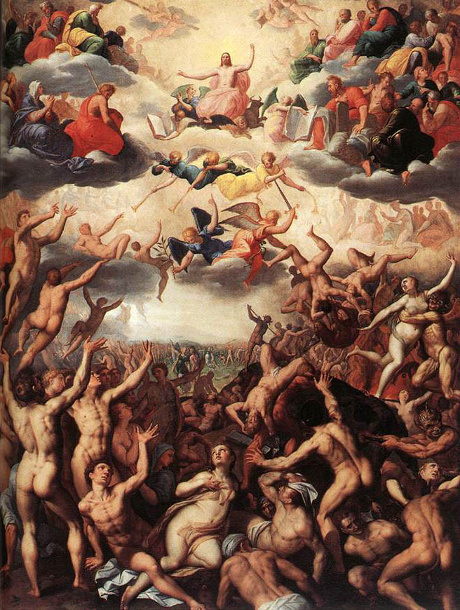 heathens experiencing the final judgment HEAVEN. A place where the wicked cease from troubling you with talk of their personal affairs, and the good listen with attention while you expound your own. IDOLATER. One who professes a religion which we do not believe, with a symbolism different our own. A person who thinks more of an image on a pedestal than of an image on a coin. INFIDEL. In New York, one who does not believe in the Christian religion; in Constantinople, one who does. INQUISITION. An ecclesiastical court for the discouragement of error by mitigating the prevalence and ameliorating the comfort of the erring. INCENSE. In religious affairs, an argument addressed to the nose. KORAN. A book which the Mohammedans foolishly believe to have been written by divine inspiration, but which Christians know to be a wicked imposture, contradictory to the Holy Scriptures. LORD. ...a title of the Supreme Being; but this is thought to be rather flattery than true reverence. MAGIC. An art of converting superstition into coin. MAYONNAISE. One of the sauces with serve the French in place of a state religion. MINISTER. An agent of a higher power with a lower responsibility. MIRACLE. An act or event out of the order of nature and unaccountable, as beating a normal hand of four kings and an ace with four aces and a king. MORTALITY. The part of immortality that we know about. MONSIGNOR. A high ecclesiastical title, of which the Founder of our religion overlooked the advantages. MYTHOLOGY. The body of a primitive people's beliefs concerning its origin, early history, heroes, deities and so forth, as distinguished from the true accounts which it invents later. PAGAN. A benighted person who prefers home-made deities and indigenous religious rites. 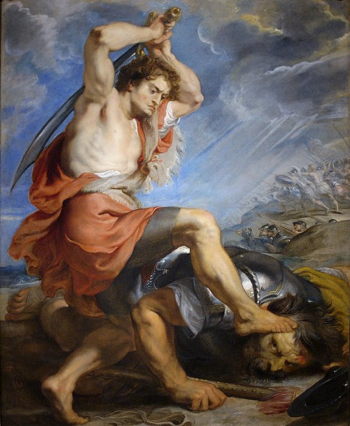 the pagan Bierce smits his enemies PANTHEISM. The doctrine that everything is God, in contradistinction to the doctrine that God is everything. PILGRIM. A traveler that is taken seriously. PRAY. To ask that the laws of the universe be annulled in behalf of a single petitioner confessedly unworthy. PRIEST. A gentleman who claims to own the inside track on the road to Paradise, and wants to charge toll on the same. PULPIT. An elevated box, into which the parson gets, for fear that people would not otherwise notice his superiority over his congregation. PURGATORY. An uncomfortable sort of calaboose, where souls are locked up until some of their relatives bail them out. 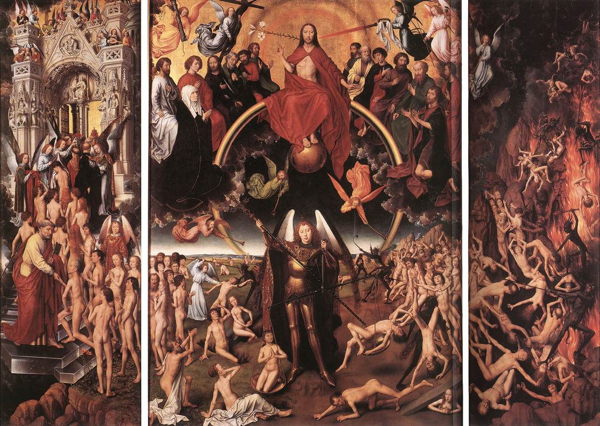 welcome to Purgatory -- and enjoy it while you can RELIGION. A daughter of Hope and Fear, explaining to Ignorance the nature of the Unknowable. SABBATH. An unknown quantity in San Francisco social life. SACRAMENT. A solemn religious ceremony in which several degrees of authority and significance are attached. Rome has seven sacraments, but the Protestant churches, being less properous, feel that they can afford only two, and these of inferior sancity. Some of the smaller sects have no sacraments at all -- for which means they will indubitably be damned. SAINT. A dead sinner revised and edited. SATAN. One of the Creator's lamentable mistakes repented in sashcloth and axes. Satan made himself multifariously objectionable and was finally expelled from Heaven.. SCRIPTURES. The sacred books of our holy religion, as distinguished from the false and profane writings on which other faiths are based. SERMON. Ground and lofty tumbling in the pulpit. Occasionally used to define a religious discourse. SOUL. A spiritual entity concerning which there hath been brave disputation. Plato held that those souls which in a previous state of existence (antedating Athens) had obtained the clearest glimpses of eternal truth entered into the bodies of persons who became philosophers.... THEOSOPHY. An ancient faith having all the certitude of religion and all the mystery of science. 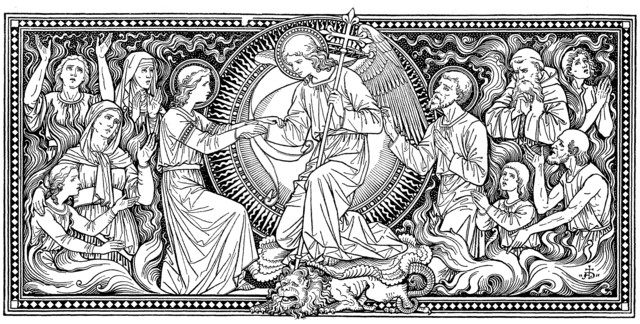 ___________________
Sources: The Devil's Dictionary in Vol. VII of Bierce's Collected Works, Neale Publishing 1909. Supplemented by The Englarged Devil's Dictionary, compiled and edited by Ernest J. Hopkins, 1967. NOTE. There is disagreement as to whether many of the entries, represented in bold in the Hopkins volume, were actually Bierce's. Some material attributed to Bierce is apocryphal, such as the bogus "War is God's way of teaching geography." |
